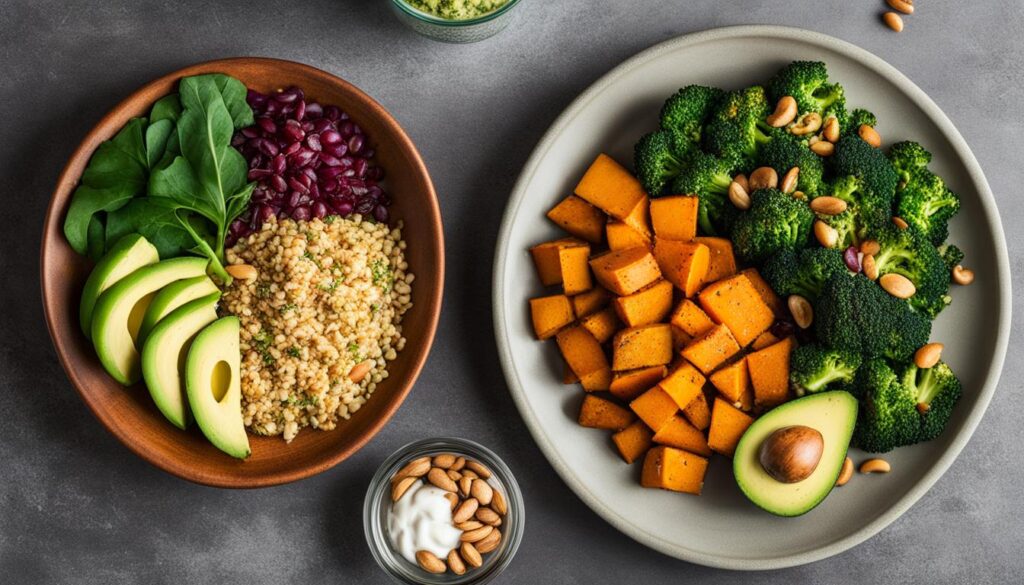Welcome to my guide on plant-based eating, where I’ll show you how to create sustainable and healthy meals that not only benefit your well-being but also contribute to a more eco-friendly food system. Adopting a plant-based diet can have a positive impact on both your health and the environment, making it a win-win choice for a healthier lifestyle.
Plant-based eating involves prioritizing the consumption of whole, plant-based foods while minimizing or eliminating the intake of animal products. By focusing on fruits, vegetables, whole grains, legumes, nuts, and seeds, you can enjoy a wide array of nutrients, vitamins, and fiber. This dietary approach has been shown to offer numerous benefits, including weight loss, reduced risk of chronic diseases such as type 2 diabetes and heart disease, improved overall well-being, and a more sustainable and eco-friendly food system.
In this comprehensive guide, I’ll discuss the basics of what constitutes a plant-based diet, the health benefits it offers, and tips for incorporating plant-based foods into your meals. I’ll also provide sample meal plans for two weeks, emphasizing a balance of flavors, nutrients, and variety. Finally, I’ll delve into the impact of plant-based eating on both personal health and the environment, as well as share tips for sustaining a plant-based lifestyle for the long term.
Key Takeaways:
- Plant-based eating focuses on consuming whole, plant-based foods while minimizing or eliminating animal products.
- Benefits of plant-based eating include weight loss, reduced risk of chronic diseases, and improved overall well-being.
- Incorporating plant-based foods can be simple by including a variety of plant-based proteins, whole grains, fruits and vegetables, legumes, and nuts and seeds in your meals.
- Planning a plant-based meal plan and opting for budget-friendly plant-based foods can help you sustain a plant-based lifestyle.
- Plant-based eating has positive impacts on personal health and the environment by reducing the risk of chronic diseases and promoting a more sustainable food system.
What is a Plant-Based Diet?
Although there is no universally agreed-upon definition for a plant-based diet, it generally refers to a dietary pattern that prioritizes the consumption of plant-based foods such as fruits, vegetables, whole grains, legumes, nuts, and seeds. Plant-based diets can include variations such as vegetarian and vegan diets, where animal products are excluded completely.
Plant-based diets are known for their abundance of fiber, vitamins, minerals, and phytochemicals. They are also typically lower in saturated fat and cholesterol compared to diets that include animal products. By focusing on plant-based proteins and high-fiber foods, a plant-based diet offers numerous benefits for overall health and can help prevent various chronic diseases.
Adopting a plant-based diet is a lifestyle choice that can have a positive impact on both your health and the planet. The diversity of plant-based foods provides a wide range of nutrients, making it easier to meet your nutritional needs without relying on animal products. Additionally, the emphasis on fiber-rich foods supports healthy digestion and can contribute to weight management.
The inclusion of plant-based proteins and fiber is key in a plant-based diet, as they provide essential nutrients and help promote satiety and overall health.
Whether you choose a vegetarian or vegan approach, incorporating more plant-based foods into your diet can be a delicious and fulfilling journey. From vibrant fruits and vegetables to protein-packed legumes and whole grains, there is a wide variety of plant-based options to explore and enjoy.
Next, we will dive into the many benefits that come with adopting a plant-based eating pattern and how it can positively impact your health and well-being.
Benefits of Plant-Based Eating
Research suggests that adopting a plant-based eating pattern can offer numerous health benefits. Studies have shown that plant-based diets can contribute to weight loss and may lead to a lower body fat percentage and reduced waist circumference. This dietary approach also supports disease prevention and has been associated with a reduced risk of developing type 2 diabetes and heart disease. The high fiber content of plant-based foods plays a crucial role in these benefits as it promotes satiety, aids in weight management, and helps regulate blood sugar and cholesterol levels.
When it comes to health benefits, plant-based eating checks all the boxes. Let’s take a closer look at how this dietary approach can positively impact your well-being:
1. Weight Loss and Body Composition
One of the key advantages of a plant-based diet is its potential for weight loss. By focusing on whole, unprocessed plant foods, you naturally consume fewer calories while feeling fuller due to the high fiber content. Plant-based diets are typically lower in energy density, allowing you to eat satisfying portions without overloading on calories.
Furthermore, plant-based diets tend to have a positive effect on body composition. Research has shown that individuals on plant-based diets have lower body fat percentages and reduced waist circumferences compared to those following conventional diets containing animal products.
2. Disease Prevention
A plant-based eating pattern has been associated with a reduced risk of chronic diseases, including type 2 diabetes and heart disease. High-fiber plant foods, such as fruits, vegetables, whole grains, and legumes, help regulate blood sugar levels, reduce cholesterol, and lower blood pressure.
Plant-based diets are rich in antioxidants and phytochemicals, which have been shown to have protective effects against oxidative stress, inflammation, and certain types of cancer. By nourishing your body with a variety of plant-based foods, you can support your immune system and promote optimal health.
3. Reduced Risk of Type 2 Diabetes
Adopting a plant-based eating pattern has been shown to decrease the risk of developing type 2 diabetes, a chronic condition characterized by high blood sugar levels. The high fiber content in plant foods helps regulate blood sugar levels by slowing down glucose absorption, preventing blood sugar spikes, and reducing insulin resistance.
Furthermore, plant-based diets are typically lower in saturated fat and cholesterol, which are risk factors for insulin resistance and type 2 diabetes. By prioritizing plant-based foods, you can take proactive steps towards preventing and managing this metabolic disorder.
4. Heart Disease Prevention
Plant-based eating has been linked to a reduced risk of heart disease, the leading cause of death worldwide. Plant-based diets are naturally low in saturated fat and cholesterol, which are major contributors to heart disease. Instead, they are abundant in heart-healthy nutrients such as fiber, vitamins, minerals, and antioxidants.
Studies have shown that individuals following plant-based diets have lower blood pressure, total cholesterol, and LDL cholesterol levels, all of which are key markers of heart health. By embracing a plant-based eating pattern, you can nourish your heart and reduce the risk of cardiovascular complications.
“A plant-based diet can contribute to weight loss, reduce the risk of chronic diseases such as type 2 diabetes and heart disease, improve overall well-being, and support a more sustainable and eco-friendly food system.” – Mayo Clinic
5. Holistic Well-being
Plant-based eating promotes not only physical health but also overall well-being. The nutrient-dense nature of plant-based foods provides the body with essential vitamins, minerals, and antioxidants necessary for optimal functioning. This can result in increased energy levels, improved digestion, and enhanced mood.
Additionally, plant-based diets are associated with better gut health due to their high fiber content, which nourishes beneficial gut bacteria. A healthy gut microbiome has been linked to improved mental health, immune function, and reduced inflammation.
The bottom line is that plant-based eating offers a myriad of health benefits, ranging from weight management to disease prevention. By incorporating a variety of colorful fruits, vegetables, whole grains, legumes, nuts, and seeds into your diet, you can take proactive steps towards improving your health and well-being.
| Health Benefit | Description |
|---|---|
| Weight Loss | A plant-based diet can contribute to weight loss and improved body composition due to its low energy density and high fiber content. |
| Disease Prevention | Plant-based eating has been associated with a reduced risk of chronic diseases such as type 2 diabetes and heart disease, thanks to its nutrient-rich and antioxidant-packed foods. |
| Reduced Risk of Type 2 Diabetes | The high fiber content and low saturated fat in plant-based diets help regulate blood sugar levels and reduce the risk of type 2 diabetes. |
| Heart Disease Prevention | Plant-based diets are naturally low in saturated fat and cholesterol, promoting heart health and reducing the risk of cardiovascular disease. |
| Holistic Well-being | Plant-based eating supports overall well-being by providing essential nutrients, improving gut health, and boosting energy levels. |
Easy Tips for Incorporating Plant-Based Foods
Incorporating plant-based foods into your meals can be a delightful and straightforward way to improve your health and well-being. By including a diverse range of plant-based proteins, whole grains, fruits and vegetables, legumes, nuts, and seeds, you can create delicious and nutritious meals that will satisfy your taste buds and nourish your body.
Plant-Based Proteins
Plant-based proteins are an essential component of a well-rounded plant-based diet. They provide the necessary amino acids for muscle repair and growth, and they are also rich in fiber and other beneficial nutrients. Incorporating a variety of plant-based proteins in your meals ensures that you get a wide array of nutrients.
- Beans and lentils: Whether it’s black beans, chickpeas, or red lentils, legumes are excellent sources of protein and fiber. You can use them in soups, stews, salads, or as a base for plant-based patties.
- Tofu and tempeh: These soy-based products are versatile and can be used in stir-fries, curries, or grilled for a delicious plant-based protein option.
- Edamame: These young soybeans are not only a tasty snack but also a good source of plant-based protein. Enjoy them steamed as a snack or add them to salads and stir-fries.
Whole Grains
Whole grains are packed with fiber, vitamins, minerals, and antioxidants. They provide sustained energy and help keep you feeling full. Incorporating whole grains into your meals is a great way to add variety and important nutrients to your plant-based diet.
I love using whole grains like quinoa, brown rice, and whole-wheat pasta in my daily meals. Not only do they add a nutty flavor and texture, but they also provide essential nutrients and dietary fiber.
Fruits and Vegetables
Fruits and vegetables should be the stars of your plate when following a plant-based diet. They are rich in vitamins, minerals, and antioxidants that support your overall health and well-being. Aim to include a variety of fresh and frozen fruits and vegetables in your meals to add vibrant colors, flavors, and nutrients.
Legumes
Legumes, such as chickpeas, black beans, and lentils, are versatile and can be used in a wide range of recipes. They are not only excellent sources of plant-based protein but also rich in fiber, folate, and iron. Including legumes in your meals adds a hearty and satisfying element to your plant-based diet.
Nuts and Seeds
Nuts and seeds are nutritional powerhouses that offer healthy fats, protein, fiber, vitamins, and minerals. They add a delightful crunch and flavor to your dishes while boosting their nutritional value. Incorporating nuts and seeds, such as almonds, walnuts, chia seeds, and flaxseeds, into your meals is a simple way to enhance the taste and nutrient profile of your plant-based diet.
By incorporating these plant-based foods into your meals, you can create a well-balanced and delicious plant-based diet. Try experimenting with different recipes and flavors to discover the endless possibilities of plant-based eating. Remember to focus on variety, color, and nutrient density to provide your body with the nourishment it needs for optimal health.
Planning a Plant-Based Meal Plan
Creating a well-rounded plant-based meal plan is key to ensuring a balanced and sustainable approach to your diet. By incorporating a variety of plant-based recipes for breakfast, lunch, dinner, and snacks into your weekly meal plan, you can enjoy a delicious and nutritious eating experience.
When planning your meals, it’s important to focus on incorporating different types of fruits, vegetables, whole grains, and plant-based proteins to meet your nutritional needs. This will ensure that you’re getting a wide range of vitamins, minerals, and antioxidants that are essential for your overall well-being.
Meal prepping is also a helpful strategy when following a plant-based lifestyle. By dedicating some time to prepare your meals in advance, you can save time during the week and ensure that you always have nutritious options readily available. Meal prepping can be as simple as chopping vegetables, cooking grains, and portioning out ingredients for easy assembly later.
Aim for a balance of macronutrients in your meals. Include a combination of complex carbohydrates from whole grains, protein from plant-based sources such as legumes, tofu, or tempeh, and healthy fats from nuts, seeds, and avocados. This will not only provide you with sustained energy throughout the day but also support your overall health and well-being.
Don’t forget to add a variety of colors and flavors to your meals. This not only makes your meals visually appealing but also ensures that you’re getting a wide range of nutrients. Experiment with different herbs, spices, and seasonings to enhance the taste of your dishes and keep your taste buds excited.
Benefits of Planning a Plant-Based Meal Plan
Planning a plant-based meal plan offers various benefits, including:
- Ensuring a well-balanced and nutrient-rich diet
- Supporting sustainability and eco-friendly food choices
- Saving time by meal prepping and having meals ready to go
- Enjoying a wide range of delicious plant-based recipes
By following a plant-based meal plan, you can optimize your health, reduce your environmental impact, and unlock the potential for delicious and satisfying meals.

| Meal | Recipe |
|---|---|
| Breakfast | Avocado toast with a side of mixed berries |
| Lunch | Quinoa salad with roasted vegetables and a tangy lemon dressing |
| Dinner | Lentil curry with brown rice and steamed broccoli |
| Snack | Hummus with carrot sticks and whole-grain pita chips |
By incorporating a variety of plant-based meals into your plan, you can ensure that you’re getting a wide range of nutrients while enjoying delicious and satisfying dishes.
Budget-Friendly Plant-Based Eating
Eating a plant-based diet can be both nutritious and affordable. With a little planning and strategic shopping, you can enjoy the benefits of plant-based eating on a budget. Here are some budget-friendly plant-based foods that you can incorporate into your meals:
- Legumes: Canned or dried beans and lentils are excellent sources of protein and fiber. They are also affordable and versatile, making them a staple in plant-based cooking.
- Nuts and Seeds: Almonds, walnuts, and chia seeds are packed with healthy fats and nutrients. They can add a flavorful crunch to your meals without breaking the bank.
- Whole Grains: Opt for affordable whole grains like quinoa, brown rice, and oats. They are nutritious and provide a good source of carbohydrates and fiber.
- Fruits and Vegetables: Buying fruits and vegetables that are in season can help you save money. You can also opt for frozen options, which are often more budget-friendly and just as nutritious.
By including these affordable plant-based foods in your diet, you can enjoy a wide variety of delicious and nutritious meals without straining your budget.
“Eating a plant-based diet can be both nutritious and affordable. With a little planning and strategic shopping, you can enjoy the benefits of plant-based eating on a budget.”
| Tip | Description |
|---|---|
| Shop in Bulk | Purchasing legumes, nuts, seeds, and grains in bulk can help you save money in the long run. |
| Meal Prep | Prepare your meals in advance to prevent food waste and save money on eating out. |
| Buy Frozen Fruits and Vegetables | Frozen fruits and vegetables are often more affordable than fresh ones and can be just as nutritious. |
| Grow Your Own Produce | If you have space, consider starting a small garden to grow your own fruits, vegetables, and herbs. |
Plant-Based Meal Plan – Week 1
Here is a sample plant-based meal plan for week 1 to give you an idea of how to structure your meals. The plan includes delicious plant-based recipes for breakfast, lunch, dinner, and snacks. It provides options for each meal and offers variety to keep your meals exciting and enjoyable. The plan emphasizes whole, plant-based foods while providing a balanced combination of macronutrients and flavors. Feel free to customize the plan based on your preferences and dietary needs.
Breakfast Recipes:
- Fruit and Nut Overnight Oats
- Avocado Toast with Chickpea Scramble
- Smoothie Bowl with Berries and Almond Butter
Lunch Recipes:
- Quinoa Salad with Roasted Vegetables
- Vegan Lentil Soup
- Chickpea Salad Wraps
Dinner Recipes:
- Vegetable Stir-Fry with Tofu
- Spaghetti Squash with Marinara Sauce and Vegan Meatballs
- Curry Lentil Stew with Cauliflower Rice
Snack Ideas:
- Roasted Chickpeas
- Trail Mix with Nuts and Dried Fruit
- Crispy Kale Chips

| Day | Breakfast | Lunch | Dinner | Snacks |
|---|---|---|---|---|
| Monday | Fruit and Nut Overnight Oats | Quinoa Salad with Roasted Vegetables | Vegetable Stir-Fry with Tofu | Roasted Chickpeas |
| Tuesday | Avocado Toast with Chickpea Scramble | Vegan Lentil Soup | Spaghetti Squash with Marinara Sauce and Vegan Meatballs | Trail Mix with Nuts and Dried Fruit |
| Wednesday | Smoothie Bowl with Berries and Almond Butter | Chickpea Salad Wraps | Curry Lentil Stew with Cauliflower Rice | Crispy Kale Chips |
Plant-Based Meal Plan – Week 2
Building on the previous week’s meal plan, here is a sample plant-based meal plan for week 2. This plan continues to focus on incorporating a variety of plant-based foods while offering different recipes and flavors. It provides options for breakfast, lunch, dinner, and snacks to keep your meals interesting and nutritious. As with any meal plan, feel free to modify the recipes and adjust portion sizes according to your preferences and dietary needs.
Week 2 Breakfast Recipes
- Tofu Scramble with Spinach and Mushrooms
- Blueberry Oatmeal with Chia Seeds
- Peanut Butter Banana Toast with Cinnamon
Week 2 Lunch Recipes
- Quinoa Salad with Mixed Vegetables and Lemon Dressing
- Sweet Potato and Black Bean Burrito
- Mixed Greens Salad with Avocado and Balsamic Vinaigrette
Week 2 Dinner Recipes
- Lentil and Vegetable Curry with Basmati Rice
- Vegan Tacos with Cauliflower Walnut Meat
- Chickpea and Vegetable Stir-Fry with Brown Rice
Week 2 Snack Ideas
- Carrot Sticks with Hummus
- Apple Slices with Almond Butter
- Roasted Chickpeas with Spices
Remember, this sample meal plan is just a starting point, and you can customize it to suit your tastes and preferences. Feel free to experiment with different ingredients and flavors to keep your meals exciting and enjoyable. Stay tuned for more plant-based meal plans and recipes to support your journey towards a healthy and sustainable lifestyle.
The Impact of Plant-Based Eating on Health
Plant-based eating has been shown to have a significant impact on our health, reducing the risk of chronic diseases and promoting overall well-being. Studies reveal that adopting a plant-based diet can lower the risk of heart disease, type 2 diabetes, and certain types of cancer. By prioritizing whole, plant-based foods, we can take proactive steps towards improving our health and reducing the prevalence of chronic conditions.
The high nutrient content and fiber in plant-based foods contribute to these health benefits. Plant-based diets are naturally rich in vitamins, minerals, antioxidants, and phytochemicals, which play vital roles in maintaining our health and supporting disease prevention. These foods are also typically lower in saturated fat, cholesterol, and processed ingredients, reducing the risk factors associated with heart disease, type 2 diabetes, and cancer.
“Adopting a plant-based diet can lower the risk of heart disease, type 2 diabetes, and certain types of cancer.”
Heart disease is one of the leading causes of death worldwide. Research has consistently shown that consuming a plant-based diet can help lower blood pressure, reduce cholesterol levels, and improve overall cardiovascular health. By replacing animal-based foods with plant-based alternatives, we can reduce our intake of unhealthy fats while increasing our consumption of heart-healthy nutrients.
Type 2 diabetes is a prevalent chronic condition characterized by elevated blood sugar levels. Scientific evidence indicates that a plant-based diet, rich in fiber and low in refined carbohydrates, can improve insulin sensitivity, facilitate weight management, and decrease the risk of developing type 2 diabetes. By prioritizing whole grains, legumes, and low-glycemic fruits and vegetables, we can support better blood sugar control and reduce the likelihood of diabetes onset.
Cancer prevention is a critical aspect of maintaining long-term health. Numerous studies have indicated a link between plant-based diets and a reduced risk of certain cancers, such as colorectal, breast, and prostate cancer. The protective effects of plant-based eating may be attributed to the abundance of antioxidants, fiber, and phytochemicals found in these foods, which can help neutralize harmful free radicals and support cellular health.
“By prioritizing whole, plant-based foods, we can take proactive steps towards improving our health and reducing the risk of chronic conditions.”

By embracing a plant-based lifestyle and focusing on nourishing our bodies with whole, plant-based foods, we have the power to positively impact our health and well-being. Plant-based eating not only helps prevent chronic diseases but also provides us with a range of essential nutrients, increases our energy levels, and promotes a balanced and sustainable approach to eating.
As research continues to highlight the benefits of plant-based diets, it is becoming increasingly clear that this dietary approach offers a compelling solution for improving public health and reducing the burden of chronic disease worldwide.
Environmental Benefits of Plant-Based Eating
Choosing a plant-based diet not only has significant benefits for personal health but also plays a crucial role in positively impacting the environment. The production of animal-based foods, such as meat and dairy, contributes extensively to greenhouse gas emissions, deforestation, and water pollution. By adopting a plant-based eating pattern, we can reduce our carbon footprint and conserve natural resources, making it a more sustainable and eco-friendly dietary choice.
Plant-based eating promotes a food system that is aligned with the principles of sustainability. It is well-documented that plant-based food production requires fewer resources, including land, water, and energy, compared to animal agriculture. By shifting towards plant-based foods, we can mitigate the negative impacts of food production on the environment and contribute to a healthier planet for future generations.
| Environmental Benefits of Plant-Based Eating | Action |
|---|---|
| Reduced greenhouse gas emissions | Choosing plant-based foods minimizes the environmental impact associated with raising livestock. |
| Conserved natural resources | Plant-based food production requires fewer land, water, and energy resources compared to animal agriculture. |
| Preserved ecosystems | By reducing deforestation for livestock farming, we protect valuable ecosystems and their biodiversity. |
| Improved water quality | Plant-based eating helps reduce water pollution caused by the excessive use of fertilizers in animal agriculture. |
| Enhanced soil health | Plant-based agriculture practices, such as organic farming, promote soil fertility and reduce soil degradation. |
By making conscious choices to incorporate plant-based foods into our everyday meals, we can make a significant difference in reducing our environmental impact. Together, we can work towards a more sustainable future and create a greener planet for generations to come.
Tips for Sustaining a Plant-Based Lifestyle
Sustaining a plant-based lifestyle requires planning, commitment, and support. As someone who has been following a plant-based diet for years, I’ve learned a few valuable tips that can help you maintain long-term adherence to sustainable plant-based eating.
1. Meal Planning and Meal Prepping
One of the keys to success is meal planning and meal prepping. Take some time each week to plan your meals and create a shopping list. This way, you’ll have all the ingredients you need to prepare nutritious plant-based meals readily available. Consider batch cooking and preparing meals in advance, so you always have a healthy option on hand, even on busy days.
2. Emphasize Variety in Your Diet
Try to incorporate a wide variety of fruits, vegetables, whole grains, and plant-based proteins into your diet. Not only will this ensure that you’re getting a diverse range of nutrients, but it will also keep your meals interesting and enjoyable. Don’t be afraid to experiment with new ingredients and flavors to find what works best for you.
3. Connect with a Supportive Community
“Surround yourself with like-minded individuals who can provide support and inspiration on your plant-based journey.”
Find online forums, social media groups, and local plant-based organizations where you can connect with others who share your passion for sustainable plant-based eating. Having a supportive community can make a world of difference, especially during challenging times or when you need new recipe ideas.
4. Stay Educated
Continuously educate yourself about the benefits of plant-based eating and the latest research in the field. Stay up to date with new recipes, cooking techniques, and nutritional information. The more you know about the positive impacts of sustainable plant-based eating, the more motivated and inspired you’ll be to stick with it.
5. Be Kind to Yourself
Remember that everyone’s journey is unique, and there’s no one-size-fits-all approach to plant-based eating. Be kind to yourself and don’t beat yourself up if you slip up occasionally or find it challenging to adhere to your plant-based diet at times. What matters most is your overall commitment to sustainable plant-based eating and your efforts to make positive changes for your health and the environment.
By following these tips and developing a routine that works for you, you can sustain a plant-based lifestyle for the long term. Remember, it’s not just about what you eat but also the impact your choices have on the planet and your well-being.

Conclusion
Plant-based eating is not only a nutritious choice but also a sustainable and eco-friendly way to nourish your body and protect the planet. By prioritizing whole, plant-based foods and reducing or eliminating animal products, you can enjoy a wide range of health benefits while making a positive impact on the environment.
With a guide to plant-based eating, you can create delicious and healthy meals that support your well-being. By incorporating a variety of plant-based proteins, such as legumes and nuts, along with colorful fruits and vegetables, whole grains, and plant-based fats, you can ensure a well-balanced and nutrient-rich diet.
By adopting a plant-based lifestyle, you can experience benefits such as weight loss, reduced risk of chronic diseases like heart disease and type 2 diabetes, and overall improved well-being. Additionally, plant-based eating supports sustainable food production and reduces greenhouse gas emissions, contributing to a healthier planet for future generations.
Embark on a journey of exploring the world of plant-based eating and discover the endless possibilities for creating nutritious, sustainable, and delicious meals. With careful planning, support, and a variety of plant-based options, you can easily sustain a plant-based lifestyle and reap the long-lasting benefits for your health and the environment.
FAQ
What is a plant-based diet?
A plant-based diet is a dietary approach that emphasizes the consumption of whole, plant-based foods while minimizing or eliminating the intake of animal products. It includes foods such as fruits, vegetables, whole grains, legumes, nuts, and seeds.
What are the benefits of plant-based eating?
Plant-based eating offers numerous health benefits, including weight loss, reduced risk of chronic diseases like type 2 diabetes and heart disease, improved overall well-being, and a more sustainable and eco-friendly food system.
How can I incorporate plant-based foods into my meals?
You can incorporate plant-based foods into your meals by including a variety of plant-based proteins like beans, lentils, tofu, tempeh, and edamame. Whole grains, fruits, vegetables, legumes, nuts, and seeds are also key components of a plant-based diet.
How can I plan a plant-based meal plan?
To plan a plant-based meal plan, create a weekly plan that includes a variety of plant-based recipes for breakfast, lunch, dinner, and snacks. Make sure to incorporate different types of fruits, vegetables, whole grains, and plant-based proteins to meet your nutritional needs.
Can plant-based eating be budget-friendly?
Yes, plant-based eating can be budget-friendly. Some affordable plant-based foods include legumes like canned or dried beans and lentils, nuts, seeds, and whole grains like quinoa, brown rice, and oats. Buying fruits and vegetables that are in season and frozen options can also help you save money.
Can you provide a sample plant-based meal plan?
Absolutely! Here is a sample plant-based meal plan for week 1 to give you an idea of how to structure your meals. It includes delicious plant-based recipes for breakfast, lunch, dinner, and snacks. Feel free to customize it based on your preferences and dietary needs.
What are the health benefits of plant-based eating?
Plant-based eating has been associated with weight loss, reduced risk of heart disease, type 2 diabetes, and certain types of cancer. The high nutrient content and fiber in plant-based foods contribute to these health benefits.
How does plant-based eating benefit the environment?
Plant-based eating is more sustainable and environmentally friendly compared to diets that heavily rely on animal products. Food production, especially meat and dairy production, contributes significantly to greenhouse gas emissions, deforestation, and water pollution. Choosing plant-based foods reduces your carbon footprint and helps conserve natural resources.
What tips can you provide for sustaining a plant-based lifestyle?
To sustain a plant-based lifestyle, it’s important to plan your meals, incorporate variety in your diet by including different plant-based foods, and seek support from communities and resources that can provide inspiration and guidance.
Can you provide a conclusion on plant-based eating?
Plant-based eating is a sustainable and healthy approach to nourishing your body while benefiting the environment. By prioritizing whole, plant-based foods and minimizing or eliminating animal products, you can enjoy numerous health benefits and contribute to a more sustainable and eco-friendly food system.

